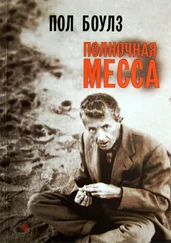Пол Боулз - Let it come down
Здесь есть возможность читать онлайн «Пол Боулз - Let it come down» весь текст электронной книги совершенно бесплатно (целиком полную версию без сокращений). В некоторых случаях можно слушать аудио, скачать через торрент в формате fb2 и присутствует краткое содержание. ISBN: , Жанр: Современная проза, на английском языке. Описание произведения, (предисловие) а так же отзывы посетителей доступны на портале библиотеки ЛибКат.
- Название:Let it come down
- Автор:
- Жанр:
- Год:неизвестен
- ISBN:1-931082-19-7
- Рейтинг книги:5 / 5. Голосов: 1
-
Избранное:Добавить в избранное
- Отзывы:
-
Ваша оценка:
- 100
- 1
- 2
- 3
- 4
- 5
Let it come down: краткое содержание, описание и аннотация
Предлагаем к чтению аннотацию, описание, краткое содержание или предисловие (зависит от того, что написал сам автор книги «Let it come down»). Если вы не нашли необходимую информацию о книге — напишите в комментариях, мы постараемся отыскать её.
Let it come down — читать онлайн бесплатно полную книгу (весь текст) целиком
Ниже представлен текст книги, разбитый по страницам. Система сохранения места последней прочитанной страницы, позволяет с удобством читать онлайн бесплатно книгу «Let it come down», без необходимости каждый раз заново искать на чём Вы остановились. Поставьте закладку, и сможете в любой момент перейти на страницу, на которой закончили чтение.
Интервал:
Закладка:
Dyar grunted, got up, thinking: «From now on I’m going to watch every move you make». As Thami rose to his feet he was still explaining about the Spanish police and their insistence upon getting all possible information about foreigners who visited the Protectorate. His words included a warning never to stand outside the house in the daytime, and never — it went without saying — to set foot inside the village at any hour of the day or night. As they went along he embroidered on the probable consequences to Dyar of allowing himself to be seen by anyone at all, in the end making everything sound so absurdly dangerous that a wave of fear swept over his listener — not fear that what Thami said might be true, for he did not believe all these variations on catastrophe for an instant, but a fear born of having asked himself only once: «Why is he saying all this? Why is he so excited about nobody’s seeing me?» For him the answer was to be found, of course, at the limits of Thami’s infamy. It was merely a question of knowing how far the man was prepared to go, or rather, since he was an Arab, how far he would be able to go. And the answer at this point was, thought Dyar: he will go as far as I let him go. So I give him no chance. Vigilance was easy enough; the difficulty lay in disguising it. The other must not suspect that he suspected. Thami was already playing the idiot; he too would be guileless, he would encourage Thami to think himself the cleverer, so that his actions might be less cautious, his decisions less hidden. One excellent protective measure, it seemed to him, would be to go to the village and then tell Thami about it. That would let him know that he was not afraid of being seen, thus depriving Thami of one advantage he seemed to feel he had over him. «And then he’d think twice before pulling anything too rough if he realized people knew I had been up here with him,» he reasoned.
«Well,» he said reluctantly, «I’m going to have a fine time up here. I can see that. You down in the town all the time and me sitting on my ass up here on the side of a mountain».
«What you mean, all the time? How many days do you Want to stay? I have to go to Tangier. My boat. That Jilali’s no good. I know him. He’s going to sell it to somebody else. You don’t care. It’s not your boat» —
«Don’t start in again,» said Dyar. But Thami launched into a lengthy monologue which ended where it had been meant to end, on the subject of how many pesetas a day Dyar was willing to pay him for his presence at Agla.
«Maybe I want him here and maybe I don’t,» he thought. It would depend on what he found and learned in the town. Plans had to be made carefully, and they might easily include the necessity of having Thami take him somewhere else. «But the quicker I can get rid of him the better». That much was certain.
Was this haggling, genuine enough in appearance, merely a part of Thami’s game, intended to dull whatever suspicion he might have, replacing it with a sense of security which would make him careless? He did not know; he thought so. In any case, he must seem to take it very seriously.
«D’you think I’m made of money?» he said with simulated ill-humor, but in such a tone that Thami might feel that the money eventually would be forthcoming. The other did not answer.
There was an olive grove covering the steep side hill that had to be gone through, a rushing stream to cross, and a slight rise to climb before one reached the house. It was built out on a flat shelf of rock whose base curved downward to rest against the mountainside astonishingly far below.
«There’s the house,» said Thami.
It’s a fort, thought Dyar, seeing the little structure crouching there atop its crazy pillar. Its thick earthen walls once had been partially whitewashed, and its steep roof, thatched in terraces, looked like a flounced petticoat of straw. The path led up, around, and out onto the promontory where the ground was bare save for a few overgrown bushes. There were no windows, but there was a patchwork door with a homemade lock, to fit which Thami now pulled from his pocket a heavy key as long as his hand.
«This is the jumping-off place all right,» said Dyar, stepping to the edge and peering down. Below, the valley had prepared itself for night. He had the feeling that no light could pierce the profound gloom in which the lower mountainside was buried, no sound change the distant, impassive murmur of water, which, although scarcely audible, somehow managed to fill the entire air. After struggling a moment with the lock Thami succeeded in getting the door open. As Dyar walked toward the house he noticed the deep troughs dug in the earth by the rain that had run from the overhanging eaves; it still dripped here and there, an intimate sound in the middle of the encompassing solitude — almost with an overtone of welcome, as if the mere existence of the house offered a possibility of relief from the vast melancholy grayness of the dying afternoon.
At least, he thought, as he stepped inside into the dark room that smelled like a hayloft, this will give me a chance to catch my breath. It might be only for a day or two, but it provided a place to lie down.
Thami opened a door on the other side of the room and the daylight came in from a tiny patio filled with broken crates and refuse. «There’s another room there,» he said with an air of satisfaction. «And a kitchen, too».
Surprisingly, the earth floor was dry. There was no furniture, but a clean straw mat covered almost half the floor space. Dyar threw himself down and lay with his head propped against the wall. «Don’t say kitchen to me unless you’ve got something in it. When are we going to eat? That’s all I want to know».
Thami laughed. «You want to sleep? I’m going now to the house of my wife’s family and get candles and food. You sleep».
«The hell with the candles, chum. You get that food».
Thami looked slightly scandalized. «Oh, no,» he said with great seriousness and an air of faint reproof. «You can’t eat without candles. That’s no good».
«Bring whatever you like». He could feel himself falling asleep even as he said it. «Just bring food too». He slipped his fingers through the handle of the brief case and laid it over his chest. Thami stepped out, closed the door and locked it behind him. There was the sound of his footsteps, and then only the occasional falling of a drop of water from the roof outside. Then there was nothing.
XXII
Even when he was fully conscious of the fact that Thami had returned and was moving about the room making a certain amount of noise, that a candle had been lighted and was shining into his face, his awakening seemed incomplete. He rose from the mat, said: «Hi!» and stretched, but the heaviness of sleep weighed him down. He did not even remember that he was hungry; although the emptiness was there in him, more marked than before he had slept, it seemed to have transformed itself into a simple inability to think or feel. He took a few steps out into the center of the room, grunting and yawning violently, and immediately wanted to lie down again. With the sensation of being half-dead, he staggered back and forth across the floor, stumbling over a large blanket which Thami had ostensibly brought from the other house, and from which he was extracting food and dishes. Then he went back to the mat and sat down. Triumphantly Thami held up a battered teapot. «I got everything,» he announced. «Even mint to put in the tea. You want to sleep again? Go on. Go to sleep». There was a crackle and sputter from the patio as the charcoal in the brazier took fire. Dyar still said nothing; it would have cost him too great an effort.
As he watched Thami busying himself with the preparations he was conscious of an element of absurdity in the situation. If it had been Hadija preparing his dinner, perhaps he would have found it more natural. Now he thought he should offer to help. But he said to himself: «I’m paying the bastard,» did not stir, and followed Thami’s comings and goings, feeling nothing but his consuming emptiness inside, which, now that at last he was slowly waking, made itself felt unequivocally as hunger.
Читать дальшеИнтервал:
Закладка:
Похожие книги на «Let it come down»
Представляем Вашему вниманию похожие книги на «Let it come down» списком для выбора. Мы отобрали схожую по названию и смыслу литературу в надежде предоставить читателям больше вариантов отыскать новые, интересные, ещё непрочитанные произведения.
Обсуждение, отзывы о книге «Let it come down» и просто собственные мнения читателей. Оставьте ваши комментарии, напишите, что Вы думаете о произведении, его смысле или главных героях. Укажите что конкретно понравилось, а что нет, и почему Вы так считаете.









